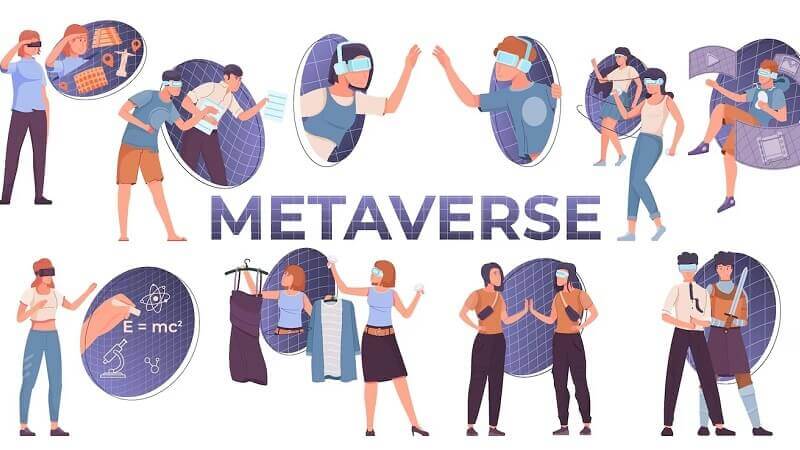You hear about it every day, but don’t understand how the metaverse makes money? Don’t worry, we’ll take care of answering this question.
As the concept of the metaverse continues to gain traction, many industries are capitalizing on its potential for various applications, such as gaming, education, and e-commerce.
In this article, we will delve into the various revenue streams that the metaverse is currently utilizing and explore the potential for future growth in this digital world.

Virtual Real Estate
If we are talking about how the metaverse makes money, we cannot avoid talking about virtual real estate.
In the digital landscape of the metaverse, virtual real estate is emerging as a prime investment opportunity. Similar to physical real estate, virtual land ownership offers various ways to generate income, including leasing, renting, and capital appreciation.
Limited Supply and Increasing Demand
One of the most lucrative revenue streams in the metaverse is virtual real estate. Just like in the physical world, digital land is a limited resource, and as more people join the metaverse, the demand for virtual land increases. Virtual land is often sold as non-fungible tokens (NFTs), which represent unique, digital assets that cannot be replicated or replaced. Investors and developers can purchase parcels of virtual land to build virtual businesses, homes, or other structures.
Passive Income Opportunities
As the metaverse grows in popularity, the value of virtual real estate is expected to increase. Some digital land parcels have already sold for millions of dollars, with buyers anticipating that the scarcity of available land will drive up its value. Virtual real estate owners can also generate income by leasing or renting their digital land to other users, offering a steady stream of passive income.

Digital Goods and Services
Talking about selling digital goods is another way to understand how the metaverse makes money.
The metaverse economy thrives on the exchange of digital goods and services, ranging from virtual clothing to digital art. As the demand for unique digital assets increases, businesses from various industries can capitalize on this growing market.
NFT-based Digital Assets
Another significant revenue stream in the metaverse is the sale of digital goods and services. Users can purchase a wide range of items, such as clothing, furniture, and vehicles, to enhance their virtual experience. Like virtual real estate, these digital items are often represented as NFTs, ensuring their uniqueness and value.
Business Opportunities for Various Industries
Businesses can capitalize on the demand for digital goods by creating and selling their own digital products. For instance, fashion brands can design and sell virtual clothing items that users can wear within the metaverse, while artists can create and sell virtual art pieces for users to display in their virtual homes. The possibilities are endless, and as the metaverse continues to grow, so will the market for digital goods and services.

Advertising and Marketing
The metaverse offers a new frontier for advertisers to engage with users on a deeper level. By creating immersive and interactive experiences, brands can develop more effective marketing campaigns and generate revenue through targeted ad placements and sponsorships. Already now there are many metaverse companies specializing in this area.
Immersive Advertising Experience
With a growing user base, the metaverse offers a new frontier for advertising and marketing. Brands can create immersive, interactive advertisements within the virtual world that engage users in a way traditional advertising cannot. By leveraging the metaverse’s capabilities, advertisers can target users more accurately based on their interests and behaviors, resulting in more effective marketing campaigns.
Sponsorship and Branded Experiences
As a result, businesses are willing to pay for advertising space within the metaverse, providing a consistent revenue stream for platform developers and virtual real estate owners. In addition to traditional display ads, businesses can also sponsor virtual events, creating branded experiences that leave a lasting impression on users.

Gaming and Entertainment
The metaverse has created new possibilities for gaming and entertainment, with developers and creators taking advantage of its unique features. In-game purchases and virtual events offer numerous revenue-generating opportunities within this burgeoning industry.
In-game Purchases and Virtual Currencies
One of the most prominent industries within the metaverse is gaming and entertainment. Game developers can create immersive, multiplayer experiences that take advantage of the metaverse’s unique features, such as shared virtual spaces, user-generated content, and social interactions. Players can purchase in-game items, upgrades, and virtual currencies, generating revenue for game developers.
Metaverse games are also gaining momentum due to their ability to generate income.
Virtual Events and Performances
Furthermore, the metaverse allows for the creation of new forms of entertainment, such as virtual concerts, live events, and interactive performances. Users can purchase tickets to these events, providing another revenue stream for creators and event organizers. As the metaverse continues to evolve, the possibilities for gaming and entertainment are expected to grow, attracting more users and revenue.

Subscription and Premium Access
As users seek exclusive features, content, and virtual spaces, subscription models and premium access have emerged as significant revenue streams in the metaverse. By offering tiered access and corporate subscriptions, businesses can cater to a wide range of users and their needs.
Talking about selling these products is another way to understand how the metaverse makes money.
Exclusive Features and Content
Another way the metaverse generates revenue is through subscription-based models and premium access. Users can opt to pay a monthly fee for access to exclusive features, content, or virtual spaces. For instance, a virtual fitness studio could offer premium access to live workout classes led by real-life trainers, while a virtual nightclub could provide subscribers with exclusive events and performances.
Tiered Subscriptions and Corporate Access
Premium access can also come in the form of tiered subscriptions, allowing users to choose the level of access that suits their needs and budget. By offering various subscription tiers, businesses can cater to a diverse range of users, increasing their revenue potential. In addition to individual subscriptions, businesses can also offer corporate subscriptions, enabling companies to access virtual spaces and tools for remote work, team building, and collaboration. As remote work continues to become more prevalent, the demand for such solutions is likely to increase, further boosting the metaverse’s revenue potential.

Education and Training
The metaverse is reshaping the way we approach learning, offering immersive virtual classrooms and industry-specific training simulations. Educational institutions and training providers can generate revenue by offering access to these engaging learning experiences.
Virtual Classrooms and Workshops
The metaverse is also revolutionizing the way we approach education and training. Virtual classrooms, workshops, and seminars can offer immersive learning experiences that can be more engaging and effective than traditional methods. Educational institutions and training providers can charge for access to these virtual learning experiences, creating a new revenue stream in the process.
Industry-specific Training Simulations
Moreover, the metaverse allows for the creation of specialized training environments tailored to specific industries, such as healthcare, manufacturing, and aviation. By offering access to these virtual training simulations, providers can generate revenue while helping professionals develop their skills in a cost-effective and safe manner.

Freelance Opportunities and Virtual Jobs
As the metaverse expands, so do opportunities for freelance work and virtual jobs across various fields. Skilled professionals can offer their services within the metaverse, contributing to its economy and generating income through their expertise.
Working as a freelancer can be a good way to enter the metaverse and make a profit.
Creative and Technical Services
As the metaverse expands, so do the opportunities for freelance work and virtual jobs. Artists, developers, and designers can offer their services to create custom virtual assets, environments, and experiences for clients. Additionally, individuals with expertise in marketing, event planning, and community management can find work within the metaverse, helping businesses and organizations connect with their target audience.
Growing Demand for Skilled Professionals
Freelancers and virtual workers can charge for their services, adding another layer to the metaverse’s economy and revenue generation. As the metaverse continues to grow and evolve, the demand for skilled professionals in various fields is likely to increase, further boosting the potential for freelance work and virtual job opportunities.

How metaverse makes money: conclusion
We have seen how the metaverse makes money and we understood that there are so many ways to make money in this industry.
The metaverse is a rapidly expanding digital universe with seemingly limitless potential for generating revenue. Through virtual real estate, digital goods and services, advertising and marketing, gaming and entertainment, subscription and premium access, education and training, and freelance opportunities, the metaverse is creating a vibrant economy that caters to a wide range of interests and needs.
As more users join the metaverse and businesses continue to innovate, the possibilities for revenue generation will only continue to grow. The metaverse is reshaping the way we interact with the digital world, and those who can adapt and capitalize on its potential are poised for success in this exciting new frontier.